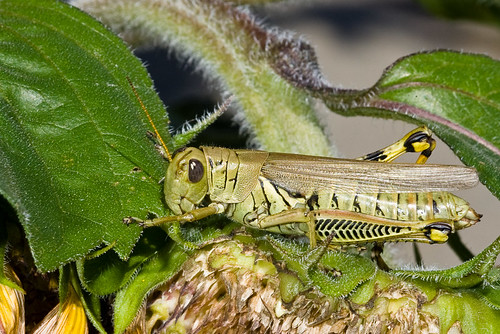Wilted Greens
Did you know that the Differential Grasshopper (Melanoplus differentialis) prefers wilted or damaged sunflowers? This one is seen on a sunflower that was damaged in recent winds we had here (tail end of Hanna). I wondered why it was that the grasshoppers (2 found) and the evidence of grasshopper activity – chewed leaves and copious amounts of feces – was all on the damaged sunflowers and not on the still healthy plants.
In 1984, A. C. Lewis published a study in Ecology which showed M. differentialis has a strong preference for wilted and damaged sunflowers. In Feeding choice trials only 1% of grasshoppers feeding on undamaged sunflower tissue when damaged or wilted tissue was available as well. The wilted leaves have higher sucrose and soluble amino acid concentrations.
In growth trials, grasshoppers which fed on mixed diet of both damaged and healthy sunflower tissue had a higher growth rate at all stages, higher fecundity, and higher survival. Grasshoppers fed only fresh healthy leaves had slower consumption rates, lower food conversion efficiency, and interestingly also had a higher feeding rate of molted skins.

The higher survival and fecundity rates may be because of the difference in diet directly, but it is likely that in part these are a result of the higher growth rate of the instar stages and increased size and health of the adults. (Bigger healthier females -> more eggs, and more robust eggs)
Classification of the Differential grasshopper:
- Kingdom
- Animalia
- Phylum
- Arthropoda
- Subphylum
- Hexapoda
- Class
- Insecta
- Order
- Orthoptera
- Suborder
- Caelifera
- Family
- Acrididae
- Genus
- Melanoplus
- Species
- Melanoplus differentialis
References:
A. C. Lewis (1984). Plant Quality and Grasshopper Feeding: Effects of Sunflower Condition on Preference and Performance in Melanoplus Differentialis Ecology, 65 (3), 836-843





















I suspect some metabolites in the healthy leaves may play a role in fitness (from the abstract: Other chemical differences between the leaves may also have a role.). At least intuitively.
ReplyDelete